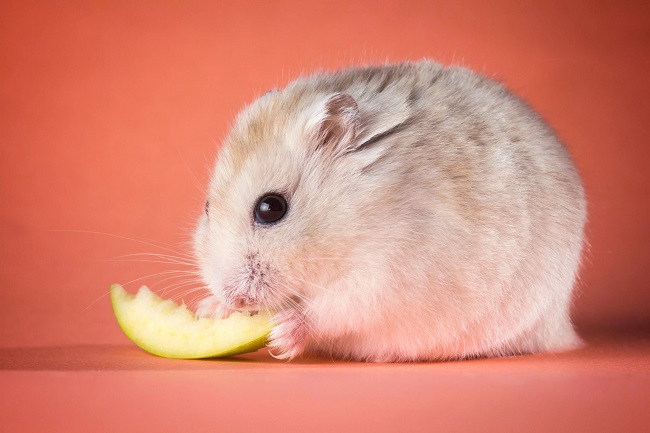Hamsters are adorable and beloved small pets known for their curious nature and unique dietary needs. As a responsible hamster owner, you may wonder if it’s safe to feed apples to your furry friend.
In this comprehensive guide, we’ll delve into the topic of hamsters and apples, discussing their nutritional value, potential risks, and guidelines for incorporating apples into your hamster’s diet. Let’s explore whether hamsters can enjoy this delicious fruit!

Understanding Hamster Nutrition
Before we discuss the specific topic of apples, it’s important to understand the nutritional needs of hamsters.
Hamsters are omnivores, meaning they eat a combination of plant-based foods and protein sources. A well-balanced diet is crucial to maintain their health and overall well-being.
Read Also:
The Benefits of Apples for Hamsters
Apples can provide several nutritional benefits for hamsters when offered in moderation. Here are some key advantages of including apples in your hamster’s diet:
Vitamins and Minerals: Apples are a rich source of vitamins A and C, as well as dietary fiber. These nutrients support your hamster’s immune system, promote healthy digestion, and contribute to overall vitality.
Hydration: Apples have a high water content, which can contribute to your hamster’s hydration levels, especially during warmer months.
Enrichment and Variety: Offering a variety of foods, including apples, can provide mental stimulation and enrichment for your hamster, making mealtime more enjoyable.
Risks and Considerations
While apples can be beneficial for hamsters, it’s important to be aware of potential risks and considerations:
Moderation: Apples should be offered in moderation as part of a balanced diet. Too many apples can lead to an imbalance in your hamster’s nutrient intake and potential digestive issues.
Portion Size and Preparation: Slice or chop the apple into small, bite-sized pieces to prevent choking hazards. Remove any seeds, as they contain trace amounts of cyanide, which can be toxic to hamsters.
Allergies and Individual Sensitivities: Some hamsters may have individual sensitivities or allergies to certain foods, including apples. Observe your hamster closely after introducing apples to ensure they tolerate them well.
Avoid Fruit Cores and Pesticides: Remove the fruit core and thoroughly wash the apple to remove any traces of pesticides or chemicals before offering it to your hamster.
Guidelines for Feeding Apples to Hamsters
To safely incorporate apples into your hamster’s diet, follow these guidelines:
Introduce Gradually: Start by offering a small piece of apple to gauge your hamster’s reaction and tolerance. If they show no adverse effects, you can gradually increase the amount.
Variety and Rotation: Apples should be offered as part of a varied diet that includes other fruits, vegetables, and protein sources. Rotate different fruits to provide nutritional diversity.
Fresh and Organic: Choose fresh, ripe apples, preferably organic, to minimize the risk of pesticides or chemical residues.
Read Also:
Conclusion
In conclusion, hamsters can enjoy apples as a nutritious and tasty treat when offered in moderation. Apples provide essential vitamins, minerals, and hydration, contributing to your hamster’s overall health.
However, it’s important to consider portion sizes, remove seeds, and observe your hamster for any sensitivities.
As always, consult with a veterinarian for personalized advice and guidance on your hamster’s specific dietary needs.
With proper care and moderation, you can safely include apples in your hamster’s diet and provide them with a varied and enjoyable culinary experience.
























